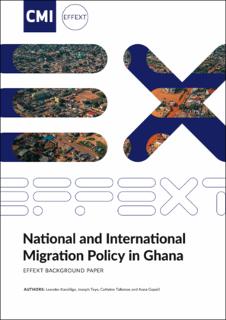EFFEXT Background Papers – National and international migration policy in Ghana
Others

Permanent lenke
https://hdl.handle.net/11250/3067379Utgivelsesdato
2023-03-01Metadata
Vis full innførselSamlinger
- Publications [1488]
Originalversjon
Bergen: Chr. Michelsen Institute (Update no. May 2023) 46 p.Sammendrag
About the EFFEXT Background Papers The Effects of Externalisation: EU Migration Management in Africa and the Middle East (EFFEXT) project examines the effects of the EU’s external migration management policies by zooming in on six countries: Jordan, Lebanon, Ethiopia, Senegal, Ghana and Libya. The countries represent origin, transit, and destination countries for mixed migration flows, and differ in terms of governance practices, state capacities, colonial histories, economic development and migration contexts. Bringing together scholars working on different case countries and aspects of the migration policy puzzle, the EFFEXT project explores the broader landscape of migration policy in Africa and the Middle East. The EFFEXT Background Papers guide the fieldwork, case selection and analysis of migration policy effects in the EFFEXT project’s case countries. The papers are based on desk-reviews of scientific literature and grey literature, the latter including government documents, governmental and non-governmental reports, white papers and working papers. This EFFEXT Background Paper provides a brief presentation of migration and migration policy dynamics in Ghana. It presents an overview of key national and international migration policies, and outlines the key migration governance structures in Ghana. In terms of international relations, the paper primarily focuses on regional and European collaboration. The Background Paper concludes with a short summary of the trends in Ghana’s collaboration with European actors, and reflects on key questions that need to be explored when studying the impact of European migration management in Ghana. Two of the paper’s co-authors , Leander Kandilige and Joseph Teye, have been involved as consultants in many of the policy development processes described in the paper, such as in the making of the Diaspora Engagement Policy and the National Labour Migration Policy, and in seve